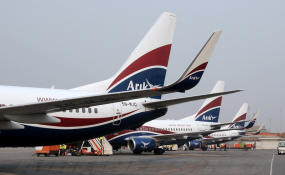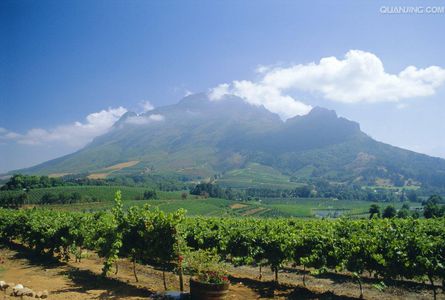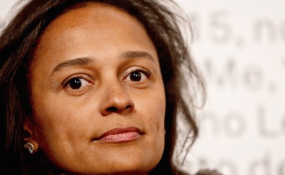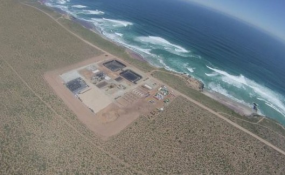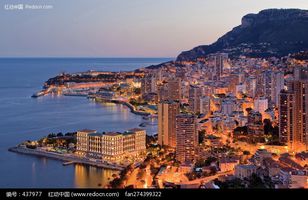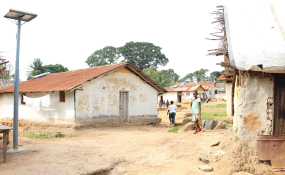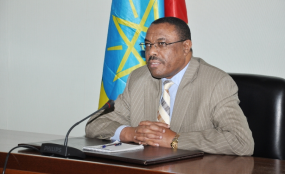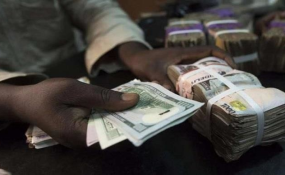By Oladeinde Olawoyin
The National Union of Air Transport Employees, NUATE, says the takeover of Arik airline by the Asset Management Corporation of Nigeria, AMCON, has worsened the crisis facing the airline.
Olayinka Abioye, General Secretary of NUATE, made this known to PREMIUM TIMES in an exclusive interview during the shutdown of the airline’s headquarters at the Lagos airport on Thursday.
Aviation unions had in the early hours of Thursday shut down the operations of Arik Air.
The unions, which include NUATE, Air Transport Services Senior Staff Association of Nigeria and the National Association of Aircraft Pilots and Engineers, on Wednesday threatened to ground the airline following Arik management’s failure to reinstate its sacked members.
The protesters also disclosed that the shutdown was because of the airline’s breach of the rights of workers and its indebtedness to aviation parastatals.
According to the protesters, Arik Air’s bad debt had crippled the operational capacities of the parastatals.
On February 9, the Asset Management Corporation of Nigeria took over Arik as a result of the airline’s bad debt to the company and other creditors.
AMCON, thereafter, appointed Roy Ilegbodu as manager of the airline and Oluseye Opasanya as the airline’s receiver manager.
The new management accused the previous management of Arik of mismanaging the airline, asking for patience of workers and creditors to reposition the airline.
But Mr. Abioye, while speaking with PREMIUM TIMES at the protest ground Thursday, alleged that the take-over of Arik by AMCON had worsened the crisis rocking Nigeria’s largest airline.
“In fact, taking over of Arik by AMCON has seemingly worsened the situation because we expected that immediately AMCON came, they would do an appraisal of issues and find out how to resolve them,” he said.
“Unfortunately, the receiver manager that AMCON brought in has crippled every avenue of social dialogue between the executives of the workers and Arik Management because what he has exhibited so far is unbridled arrogance and portrayal of himself as the owner and de facto financier of Arik.
“He has also gone further to rubbish the law which guarantees the right of workers to freedom of association… freedom to join unions,” Mr. Abioye added.
In December, the union had shut down the operations of the airline, in protest against the non-payment of salaries and other concerns. It however reached an agreement with the management, following the intervention of the Nigerian Civil Aviation Authority, NCAA.
Aviation union protesting at the Arik Air office
When probed on Thursday about the outcome of the resolution reached then, Mr. Abioye said the agreements reached in December had been breached by Arik Air’s management.
“What happened in December was a shut down like this over seven months salaries and allowances and the government intervened through the NCAA.
“But as I speak to you, those agreements were breached by Arik Management and that is one reason why this industrial action is taking place,” he said.
Commenting further, the union leader called on the federal government to sack the airline’s receiver manager, adding the airline should also pay its outstanding debts owed aviation agencies.
“The demand of the union is that this airline will remain closed until the federal government removes the receiver manager and appoints a new one who is ready to talk to people.
“We want our money that is being owed FAAN, NAMA, NCAA and others paid; money which has crippled those parastatals from performing their responsibilities to the optimum,” he said.
Mr. Abioye also disclosed that the management of the airline had yet to respond to their demands, adding that an official who claimed to be the chief security officer of AMCON had come out to threaten the protesters.
“They brought in policemen from outside to threaten us, but we will remain here until for as long as it takes us to remain here… ” he said.
PREMIUM TIMES’ efforts to speak with the management of Arik Air proved abortive.
Staff of the airline who spoke under strict condition of anonymity, however, confirmed that they had not been paid since December.
While speaking with PREMIUM TIMES, Igene Paul, NUATE Lagos State council representative, also alleged that Arik has organised a rebel group to counter the union, in a bid to scuttle the protest.
“If there is crisis here, we will not be held responsible. Staff who sabotage should be careful. We will not tolerate any nonsense from these people,” he said.
“We will stay here till one week, we are not going to leave here… we will be here from morning till dawn.”
When contacted on Thursday, Jude Nwauzor, AMCON’s Head of Corporate Communications, did not respond to calls by our correspondent. He also did not respond to text message sent to his mobile.

